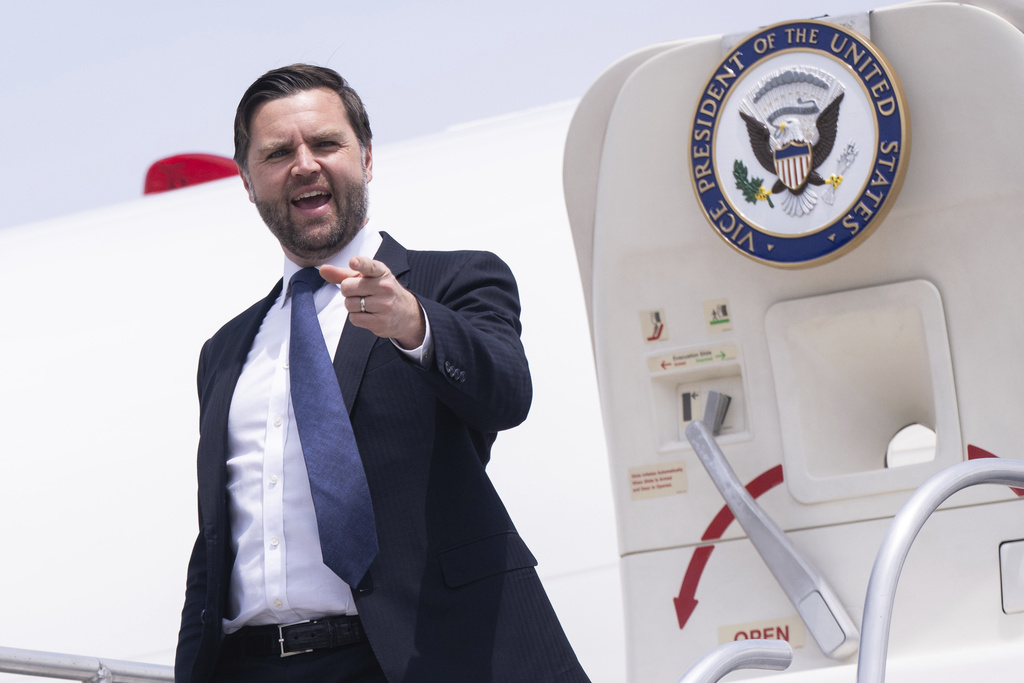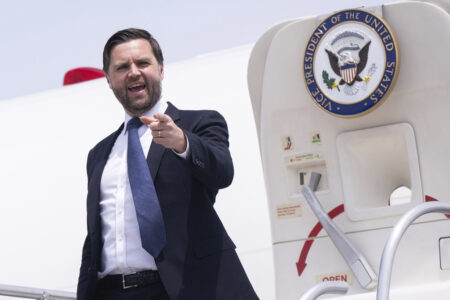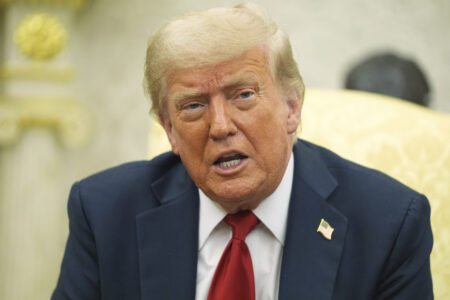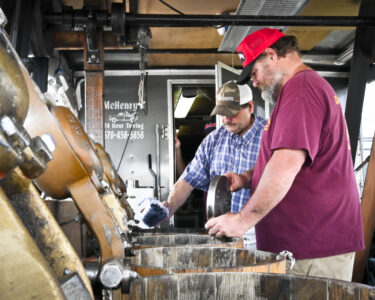Vance touts tax breaks in Pennsylvania as he makes White House’s first big pitch on Trump’s new law

Vice President JD Vance walks off Air Force Two on arrival at Wilkes-Barre Scranton Airport in Avoca, Pa., Wednesday, July 16, 2025, as he travels to speak about the "One Big Beautiful Bill Act". (Saul Loeb/Pool via AP)
WEST PITTSTON, Pa. (AP) — Vice President JD Vance on Wednesday made the Trump administration’s first big pitch to sell the public on President Donald Trump’s sweeping budget-and-policy package in the swing political turf of northeastern Pennsylvania.
The vice president, whose tiebreaking vote got the bill through the Senate, touted the legislation’s tax breaks and cast Democrats as opponents of the cutting taxes because of their unanimous opposition to the legislation.
Democrats, who’ve decried the law’s cuts to Medicaid and food stamps, are expected to try to use it against Republicans in closely contested congressional campaigns next year, including one expected to play out in the working class-area where Vance promoted the legislation.
“We worked so hard to get this legislation passed to cut your taxes, to prevent big tax increases, to make it easier to save and invest in our own country and our own people once again,” Vance said.
The Republican vice president, speaking at a machine shop in West Pittston, spotlighted the bill’s new tax deductions on overtime.
“Now, thanks to President Trump’s leadership, if you work overtime, the federal government is not going to take a dime of that overtime,” Vance said. “You earned that money. You ought to keep it in your pocket.”
He also promoted the legislation’s creation of a new children’s savings program, called Trump Accounts, with a potential $1,000 deposit from the Treasury Department.
And with an eye toward the elections next year that will determine control of Congress, Vance urged the crowd, many wearing “Make America Great Again” hats, to “talk about what the bill does for American citizens” over the next year and a half.
The historic legislation, which Trump signed into law earlier this month with near unanimous Republican support, includes key campaign pledges like no tax on tips but also cuts Medicaid and food stamps by $1.2 trillion.
Democrats recently held a town hall in House Speaker Mike Johnson’s home state of Louisiana to denounce the legislation as a “reverse Robin Hood — stealing from the poor to give to the rich.”
Vance’s office declined to elaborate on plans for other public events around the U.S. to promote the bill.
It’s unclear how much Trump plans to promote it himself. He told NBC News last week that he would travel “a little bit” to help champion the measure he dubbed the “One Big Beautiful Bill.”
“But honestly,” he said, “It’s been received so well I don’t think I have to.”
The battle for control of the messaging on the bill could be critical to how well the measure is ultimately received, as some of the most divisive parts of the law, including Medicaid and food assistance cuts, are timed to take effect only after the midterm elections. The bill was generally unpopular before its passage, polls showed, although some individual provisions are popular, like boosting the annual child tax credit and eliminating taxes on tips.
West Pittston, which sits in Republican Rep. Rob Bresnahan’s district in northeastern Pennsylvania, is a place where Trump’s populist brand of politics has found a foothold. Trump’s popularity with the white working class has accelerated the political shift in nearby areas, including around Wilkes-Barre and Scranton, turning reliably Democratic areas into contested turf and contributing to Trump’s 2024 win in Pennsylvania.
There, and in a swing district around Allentown just to the south, Republicans last year knocked off two Democratic U.S. House incumbents after years of trying.
Walter Volinski, a 74-year-old retiree from nearby Swoyersville, said he liked that the bill extended the tax cuts that Trump enacted in his first term. He said he hasn’t read the nearly 900-page legislation but he thinks most politicians haven’t either. Still, Volinski said, “I trust Donald Trump and the Republican Party to make this country a great country again.”
Steven Taylor, a 52-year-old truck driver from West Pittston, thought the new law would help people struggling to pay their bills. Taylor, a Republican who voted for Trump, said he liked that the law contained tax breaks on tips and overtime pay. “Everybody’s hurting out here,” he said. “We need a little extra help.”
But Taylor said he was concerned that his nephew, who has diabetes, could be affected by the legislation’s cuts to Medicaid. “We don’t know as of yet. But we’re really hopeful that it doesn’t,” Taylor said.
Maegan Zielinski, a 33-year-old small business owner from Wilkes-Barre who was among a group of people protesting Vance’s appearance, said she worried the law will hurt vulnerable people, including those on Medicaid and Medicare. “I do not like that it continues to support the billionaires instead of the working-class people of America, continuing to give them tax breaks while middle-class America suffers,” she said.
Debate over the budget-and-policy package is expected to shape the 2026 midterm battle for control of the House, which Democrats see as their best opportunity to block Trump’s agenda in his final two years in the Oval Office. Democrats need a net gain of three House seats to break Republican control of Washington.
As Republicans see it, they’ve now delivered broad tax cuts, funding to further boost border security and restraints on costly social safety net programs.
Democrats see a law that rolls back health insurance access, threatens the solvency of rural hospitals and raises costs for middle-class Americans while cutting taxes mostly for the rich and slashing green energy subsidies.
Bresnahan’s seat is a top Democratic target. While Bresnahan hasn’t drawn a challenger in the 2026 election, Democratic Gov. Josh Shapiro has aggressively gone after the state’s Republican members of Congress who voted for the bill, including Bresnahan.
“Shame on these members of Congress who spent the last few months saying, ‘Oh, I’ll never cut Medicaid,'” Shapiro said during an appearance earlier this month on WILK-FM radio in Wilkes-Barre. “I mean, Rep. Bresnahan told you, your listeners, your newspapers, told me to my face, this was a red line in the sand for him, he wouldn’t harm people on Medicaid, he wouldn’t harm our rural hospitals. … He caved and voted for this bill.”
Bresnahan has defended his vote by saying it strengthens Medicaid by cracking down on fraud, waste and abuse and requiring those who can work to do so. He also said it ensures hospitals in northeastern Pennsylvania will qualify for the funding they need to stay open.





